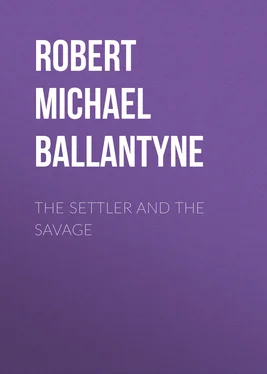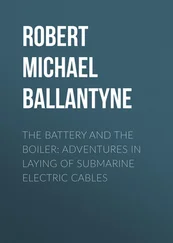Robert Michael Ballantyne - The Settler and the Savage
Здесь есть возможность читать онлайн «Robert Michael Ballantyne - The Settler and the Savage» — ознакомительный отрывок электронной книги совершенно бесплатно, а после прочтения отрывка купить полную версию. В некоторых случаях можно слушать аудио, скачать через торрент в формате fb2 и присутствует краткое содержание. Жанр: Детские приключения, literature_19, foreign_antique, foreign_prose, foreign_children, на английском языке. Описание произведения, (предисловие) а так же отзывы посетителей доступны на портале библиотеки ЛибКат.
- Название:The Settler and the Savage
- Автор:
- Жанр:
- Год:неизвестен
- ISBN:нет данных
- Рейтинг книги:4 / 5. Голосов: 1
-
Избранное:Добавить в избранное
- Отзывы:
-
Ваша оценка:
- 80
- 1
- 2
- 3
- 4
- 5
The Settler and the Savage: краткое содержание, описание и аннотация
Предлагаем к чтению аннотацию, описание, краткое содержание или предисловие (зависит от того, что написал сам автор книги «The Settler and the Savage»). Если вы не нашли необходимую информацию о книге — напишите в комментариях, мы постараемся отыскать её.
The Settler and the Savage — читать онлайн ознакомительный отрывок
Ниже представлен текст книги, разбитый по страницам. Система сохранения места последней прочитанной страницы, позволяет с удобством читать онлайн бесплатно книгу «The Settler and the Savage», без необходимости каждый раз заново искать на чём Вы остановились. Поставьте закладку, и сможете в любой момент перейти на страницу, на которой закончили чтение.
Интервал:
Закладка:
“I do believe we ’ave,” assented Jerry. “What’s to be done?”
“Gang to the best hotel,” suggested Sandy.
“But where is the best ’otel?”
“H’m! ’ee may ask that.”
A burst of noisy laughter just behind them caused the lost ones to turn abruptly, when they observed four tall young men of gentlemanly aspect sitting in a small military tent, and much amused apparently at their moist condition.
“Why, where did you two fellows come from?” asked one of the youths, issuing from the tent.
“From England and Scotland,” replied Jerry Goldboy promptly.
“From the sea, I should say,” returned the youth, “to judge from your wet garments.”
“Ay, we’ve been drookit,” said Sandy Black.
“Bring ’em in, Jack,” shouted one of the other youths in the tent.
“Come inside,” said he who was styled Jack, “and have a glass of whisky. There’s nothing like whisky to dry a wet skin, is there, Scotty?”
To this familiar appeal Sandy replied, “m–h’m,” which word, we may add for the information of foreigners, is the Scotch for “Yes.”
“Sit down there on the blankets,” said the hospitable Jack, “we haven’t got our arm-chairs or tables made yet. Allow me to introduce my two brothers, James and Robert Skyd; my own name is the less common one of John. This young man of six feet two, with no money and less brain, is not a brother—only a chum—named Frank Dobson. Come, fill up and drink, else you’ll catch a cold, or a South African fever, if there is such a thing. Whom shall I pledge?”
“My name is Jerry Goldboy,” said the Englishman; “your health, gentlemen.”
“’Am Sandy Black,” said the Scot; “here’s t’ee.”
“Well, Mr Black and Mr Coldboy”—Goldboy, interposed Jerry—“I speak for my brothers and friend when I wish you all success in the new land.”
“Do talk less, Jack,” said Robert Skyd, the youngest brother, “and give our friends a chance of speaking—Have you come ashore lately!”
“Just arrived,” answered Jerry.
“I thought so. You belong to the Scotch party that goes to Baviaans River, I suppose?” asked Frank Dobson.
This question led at length to a full and free account of the circumstances and destination of each party, with which however we will not trouble the reader in detail.
“D’ee ken onything aboot Baviaans River?” inquired Sandy Black, after a variety of subjects had been discussed.
“Nothing whatever,” answered John Skyd, “save that it is between one and two hundred miles—more or less—inland among the mountains, and that its name, which is Dutch, means the River of Baboons, its fastnesses being filled with these gentry.”
“Ay, I’ve heard as much mysel’,” returned Sandy, “an’ they say the craters are gey fierce. Are there ony o’ the big puggies in the Albany district?”
“No, none. Albany is too level for them. It lies along the sea-coast, and is said to be a splendid country, though uncomfortably near the Kafirs.”
“The Kawfirs. Ay. H’m!” said Sandy, leaving his hearers to form their own judgment as to the meaning of his words.
“An’ what may your tred be, sir?” he added, looking at John Skyd.
The three brothers laughed, and John replied—
“Trade? we have no trade. Our profession is that of clerks—knights of the quill; at least such was our profession in the old country. In this new land, my brother Bob’s profession is fun, Jim’s is jollity, and mine is a compound of both, called joviality. As to our chum Dobson, his profession may be styled remonstrance, for he is perpetually checking our levity, as he calls it; always keeping us in order and snubbing us, nevertheless we couldn’t do without him. In fact, we may be likened to a social clock, of which Jim is the mainspring, Bob the weight, I the striking part of the works, and Dobson the pendulum. But we are not particular, we are ready for anything.”
“Ay, an’ fit for nothin’,” observed Sandy, with a peculiar smile and shrug, meant to indicate that his jest was more than half earnest.
The three brothers laughed again at this, and their friend Dobson smiled. Dobson’s smile was peculiar. The corners of his mouth turned down instead of up, thereby giving his grave countenance an unusually arch expression.
“Why, what do you mean, you cynical Scot!” demanded John Skyd. “Our shoulders are broad enough, are they not? nearly as broad as your own.”
“Oo’ ay, yer shoothers are weel aneugh, but I wadna gie much for yer heeds or haunds.”
Reply to this was interrupted by the appearance, in the opening of the tent, of a man whose solemn but kindly face checked the flow of flippant conversation.
“You look serious, Orpin; has anything gone wrong?” asked Frank Dobson.
“Our friend is dying,” replied the man, sadly. “He will soon meet his opponent in the land where all is light and where all disputes shall be ended in agreement.”
Orpin referred to two of the settlers whose careers in South Africa were destined to be cut short on the threshold. The two men had been earnestly religious, but, like all the rest of Adam’s fallen race, were troubled with the effects of original sin. They had disputed hotly, and had ultimately quarrelled, on religious subjects on the voyage out. One of them died before he landed; the other was the man of whom Orpin now spoke. The sudden change in the demeanour of the brothers Skyd surprised as well as gratified Sandy Black. That sedate, and literally as well as figuratively, long-headed Scot, had felt a growing distaste to the flippant young Englishers, as he styled them, but when he saw them throw off their light character, as one might throw off a garment, and rise eagerly and sadly to question Orpin about the dying man, he felt, as mankind is often forced to feel, that a first, and especially a hasty, judgment is often incorrect.
Stephen Orpin was a mechanic and a Wesleyan, in virtue of which latter connection, and a Christian spirit, he had been made a local preacher. He was on his way to offer his services as a watcher by the bedside of the dying man.
This man and his opponent were not the only emigrants who finished their course thus abruptly. Dr Cotton, the “Head” of the “Nottingham party,” Dr Caldecott and some others, merely came, as it were like Moses, in sight of the promised land, and then ended their earthly career. Yet some of these left a valuable contribution, in their children, to the future colony.
While Black and his friend Jerry were observing Orpin, as he conversed with the brothers Skyd, the tall burly Englishman from whose shoulders the former had been hurled into the sea, chanced to pass, and quietly grasped the Scot by the arm.
“Here you are at last! Why, man, I’ve been lookin’ for you ever since that unlucky accident, to offer you a change of clothes and a feed in my tent—or I should say our tent, for I belong to a ‘party,’ like every one else here. Come along.”
“Thank ’ee kindly,” answered Sandy, “but what between haverin’ wi’ thae Englishers an’ drinkin’ their whusky, my freen’ Jerry an’ me’s dry aneugh already.”
The Englishman, however, would not listen to any excuse. He was one of those hearty men, with superabundant animal spirits—to say nothing of physique—who are not easily persuaded to let others follow their own inclinations, and who are so good-natured that it is difficult to feel offended with their kindly roughness. He introduced himself by the name of George Dally, and insisted on Black accompanying him to his tent. Sandy being a sociable, although a quiet man, offered little resistance, and Jerry, being a worshipper of Sandy, followed with gay nonchalance.
Читать дальшеИнтервал:
Закладка:
Похожие книги на «The Settler and the Savage»
Представляем Вашему вниманию похожие книги на «The Settler and the Savage» списком для выбора. Мы отобрали схожую по названию и смыслу литературу в надежде предоставить читателям больше вариантов отыскать новые, интересные, ещё непрочитанные произведения.
Обсуждение, отзывы о книге «The Settler and the Savage» и просто собственные мнения читателей. Оставьте ваши комментарии, напишите, что Вы думаете о произведении, его смысле или главных героях. Укажите что конкретно понравилось, а что нет, и почему Вы так считаете.












